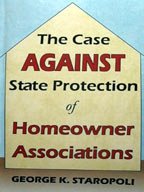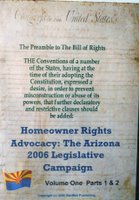HOAs require unrealistic human behavior
Dear Arizona Republic Editor,
I'm amazed at the rose colored look at the hopeful benefits claimed by planned community supporters that HOAs help shape better communities. In "Neighborhood groups fight apathy", there's the failure to understand that, in spite of the special interest group's promotion, HOAs have not been about better communities, but about better property values. And to attain that goal, arbitrary and profit-motivated rules and restrictions are instituted and imposed on homeowners under the guise of fully informed consent.
This wishful thinking is reflected in statements, such as quoted, "a unique opportunity to become a close-knit community" and "to have pride in the cooperative relationship they have with their HOA." These are want-it-to-be statements, and are based on unrealistic human behavior. Apathy results when a certain behavior pattern is demanded in order to make the HOA work, but the members do not agree with the demands and feel helpless to change them. They really bought a home and not an active participation in the government of a society that demands behavior inconsistent with human behavior patterns.
If the state should stop mandating homeowner associations and ramming these unworkable demands on people, then the problems with homeowner associations will improve.
I'm amazed at the rose colored look at the hopeful benefits claimed by planned community supporters that HOAs help shape better communities. In "Neighborhood groups fight apathy", there's the failure to understand that, in spite of the special interest group's promotion, HOAs have not been about better communities, but about better property values. And to attain that goal, arbitrary and profit-motivated rules and restrictions are instituted and imposed on homeowners under the guise of fully informed consent.
This wishful thinking is reflected in statements, such as quoted, "a unique opportunity to become a close-knit community" and "to have pride in the cooperative relationship they have with their HOA." These are want-it-to-be statements, and are based on unrealistic human behavior. Apathy results when a certain behavior pattern is demanded in order to make the HOA work, but the members do not agree with the demands and feel helpless to change them. They really bought a home and not an active participation in the government of a society that demands behavior inconsistent with human behavior patterns.
If the state should stop mandating homeowner associations and ramming these unworkable demands on people, then the problems with homeowner associations will improve.



